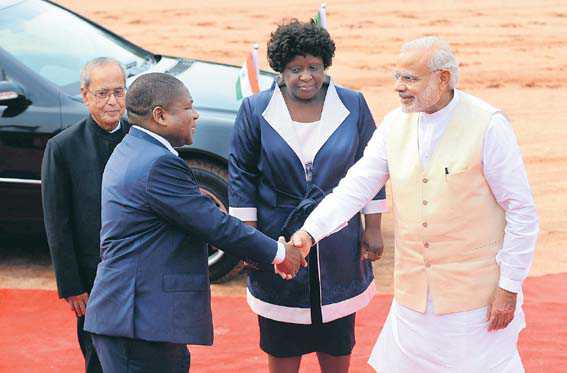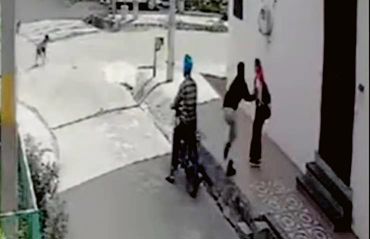
Rebonding: Mozambique is on the PM’s four-nation African tour, beginning July 7.
KC Singh
PRIME Minister Narendra Modi, after two years in office, finally gave a calibrated television interview to a fawning anchor. The PM’s remarks on foreign policy give an insight into his thinking. Undoubtedly, China blocking India’s entry into the NSG, despite his personal intervention with Chinese President Xi Jinping at Tashkent, was in his thoughts.
Three interlocking comments are noteworthy. First, that the Cold War bipolarity is over. Hence, it was level playing field and India was free to engage the entire global community. Finally, the PM — on his globe-trotting — postulated that as the world came to know “Modi” (referring to himself in the third person), they would perforce be drawn to India. He, naturally, did not mention that he was also bolstering his own image dented by past visa denials.
This strategic perception of the world derives from the Sanskrit phrase Vasudhaiva kutumbakam — the world is one family. While Modi is historically right that the Cold War ended in the early 1990s with the Soviet Union’s collapse, but the new bipolarity between a relatively weaker US and an ascendant China is already upon us. However, while berating Pakistan, he seemed reticent on China. Whether this is dissimulation to avoid open confrontation and calibrated counter-measures, which may follow, or Nehruvian self-delusion, only time will tell.
Global outreach, as a novel Modi doctrine, ignores history. The developing world, particularly Africa, has always welcomed India because of the relentless Indian support to de-colonisation post-Indian Independence, at the UN. Despite periodic foreign exchange paucity, India maintained training and development assistance to African countries. India joining the Commonwealth led other nations gaining independence from Britain doing likewise. Nonalignment was a quest for the developing world as a family. More recently, Indian lines of credit, grants and training slots to Africa were incrementally enhanced during the UPA rule, as two India-Africa summits were held to bolster ties.
PM Modi’s four-nation African tour from July 7, covering prominent east-coast nations — Mozambique, South Africa, Tanzania and Kenya — builds on this past legacy. It also supplements visits by the President and Vice-President earlier to West and North Africa, respectively. While India has traded with East Africa since time immemorial, the British took Indian workers to run their African colonies from which have spawned the diaspora and the modern links. The five-nation East African Community, founded in 2000 to coordinate infrastructure development, is an East African success story.
The China factor lingers whenever India engages Africa. Deep pockets and hunger for resources during the early part of this century, when Chinese economy was growing at double- digit rate, pales the Indian presence. In 2014, while the China-Africa trade was $200 billion, India’s languished at $70 billion. Indian investments are also $35 billion, considerably below China’s. However, two factors now favour India. One, the Chinese use of its own labour to extract resources with unseemly hurry has created a backlash and is seen as exploitative. Two, the slowdown of the Chinese economy — growing, many believe, well below the target rate of 7.5 per cent — presents India an opportunity, as commodity exporting countries are in recession. The US shale gas revolution has also affected gas exporting nations like Mozambique. Between 2010 and 2014, African countries growing at 6 per cent, or more, fell from 25 to 12, and those with low inflation being only six. Three of them are EAC members. Kenya, with its pro-West tilt, was always an exception to the warm India-Africa ties. However, with a new dynamic President, Uhuru Kenyatta, it is perhaps ready to embrace India.
Africa also can be critical for food security, with 600 million hectares of arable uncultivated land, constituting 60 per cent of the global total, making it tomorrow’s granary for a growing population in the developing world. Even in 1950-60, the then Raja of Faridkot applied for permission to acquire land in Ethiopia, ruled by the then Emperor Haile Selassie. In the period 2000-11, 948 land deals for 124 million hectares were registered; among buyers are rich Gulf states. But land can be an emotive issue and there are reports of local ire over the diversion of water, exploitation of labour, etc. In Africa, only 5 per cent of cultivated land is irrigated, compared to 41 per cent in Asia. There would also be the element of security as many of these states have weak institutions.
The Modi doctrine of personalised diplomacy will flounder, as in the case of NSG, if it ignores geo-political fault lines, or the emerging balance of the power game between China and the US, or, indeed, lessons of history. It can be a useful adjunct to a grand strategy in a de-globalising world. President George W Bush erred in 2001 when he declared on meeting Russian President Putin that he found him trustworthy as he “got a sense of his soul”. A Soviet expert would have told him that former KGB agents do not let their souls interfere with realpolitik.
The Cabinet rejig presents an unintended irony in the Ministry of External Affairs created by again personal chemistry trumping objective analysis. Minister of State Gen VK Singh (retd) — persistently advocating honouring of Maharana Pratap, routed in the Battle of Haldighat by Emperor Akbar’s forces — now faces another Akbar, MJ, perhaps wresting the Gulf and West Asia from him. Modi thereby succumbs to the fallacy that a Muslim is best to deal with the Islamic world, a Congress-perpetrated myth which PM Vajpayee rejected. Do the P5 members of the UNSC even send Muslim envoys to Islamic nations? It was Jaswant Singh, as External Affairs Minister, who struck a vital equation with the then Saudi Crown Prince Abdullah, laying the foundation of the present close engagement.
Resting foreign policy on seeking universal goodwill through personal diplomacy is not a strategy in a world with assertive China, diabolical radical Islam and anti-globalisation and free trade virus in the veins of Europe and the US. Henry Kissinger, in a 1963 critique of the Kennedy administration, wrote that they ran a “government by improvisation and manipulation”. He added their government lacked strategic clarity in “a period of revolutionary change”. He had Vietnam in mind. It sums up the Indian dilemma today. Hopefully, now that the PM is at spring cleaning, seeking a tangible strategy comes next.
The writer is a former Secretary, Ministry of External Affairs



























